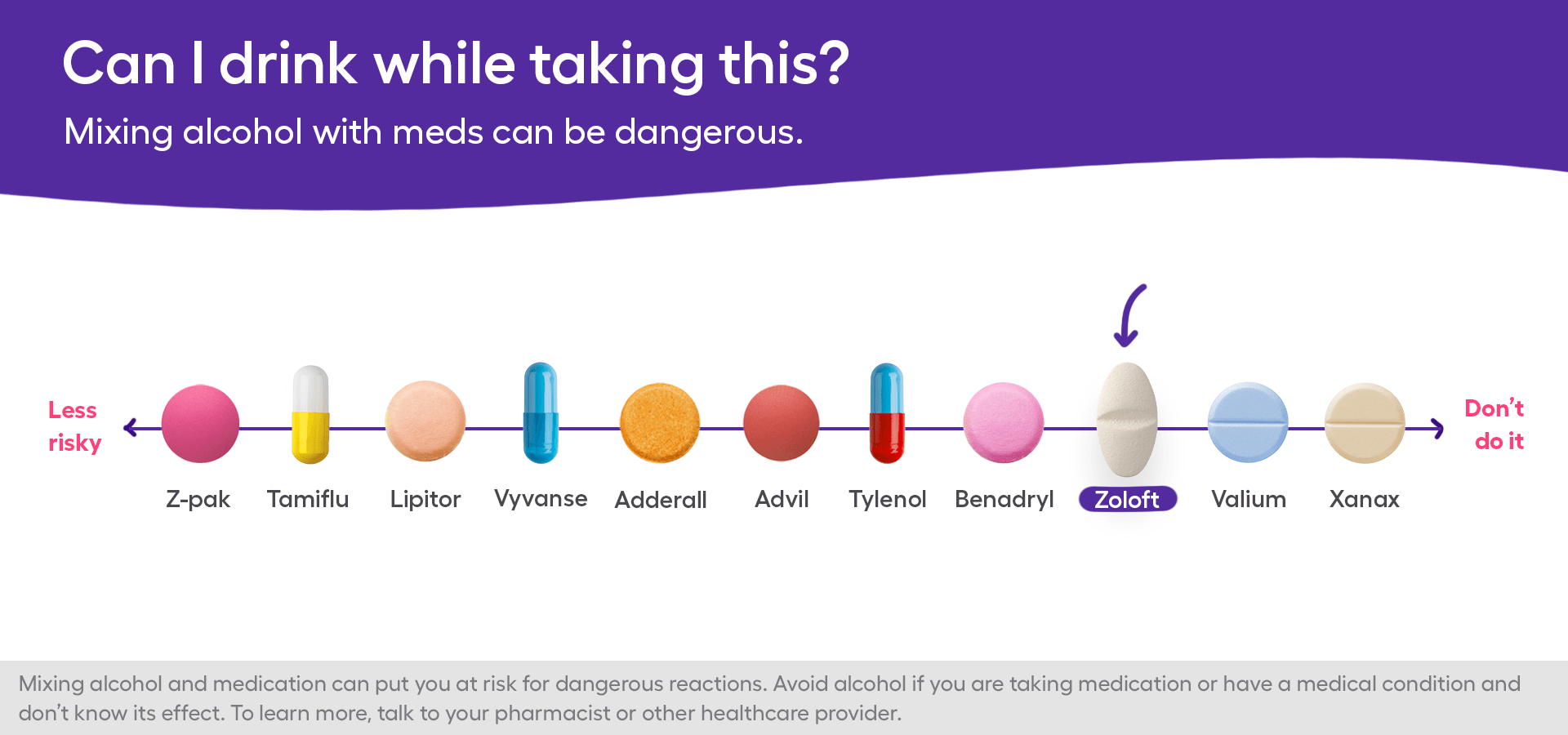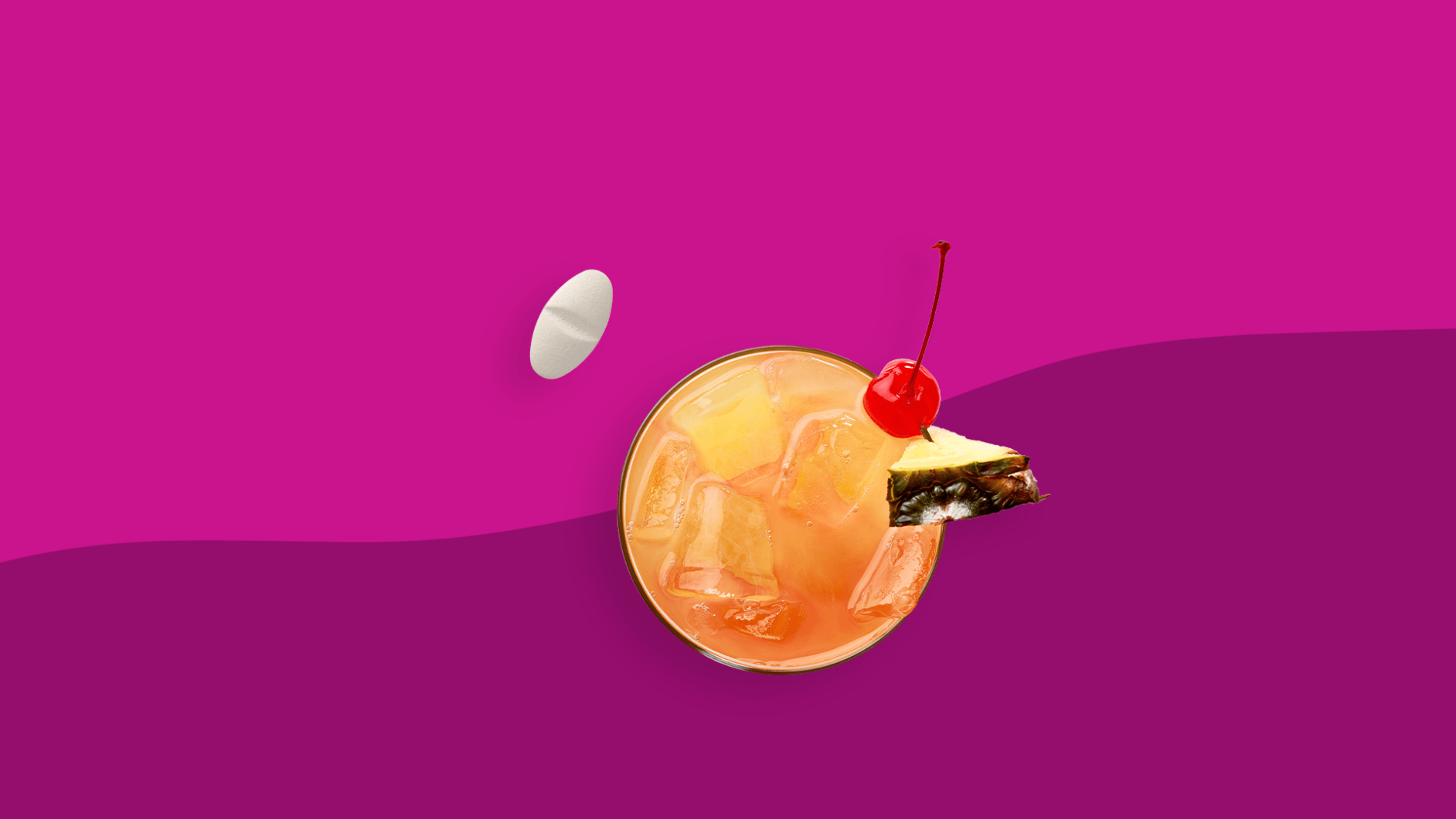Key takeaways
Mixing Zoloft (an SSRI antidepressant) with alcohol is unsafe as it can intensify Zoloft’s side effects, like excess sedation and dizziness, and impair decision-making and reaction time.
Drinking alcohol while taking Zoloft can worsen depression symptoms in the long term and increase the risk of alcohol dependence and serious side effects such as suicidal thoughts.
If Zoloft is taken after consuming alcohol, it’s recommended to have someone monitor the individual’s condition and seek emergency medical help if severe side effects or suicidal thoughts occur.
Alcohol use disorder and depression are linked, with increased alcohol consumption heightening the risk of depression, and individuals with both conditions have a higher risk of suicide.
Finally, the night you’ve been waiting for—after months and months of social isolation, you’re dressed to the nines to go meet friends for outdoor cocktails. After a fantastic evening, you come home exhausted, but before you fall into bed, you remember that you need to take your nightly medication—Zoloft (sertraline). It’s an SSRI (selective serotonin reuptake inhibitor) that treats depression. As you swallow the pill with some water, panic sets in! Wait—are Zoloft and alcoholic drinks safe together?
What is Zoloft?
Zoloft is an FDA-approved antidepressant. Other similar prescription medications that you may have heard of in the SSRI drug class include: Prozac (fluoxetine), Paxil (paroxetine), Celexa (citalopram), and Lexapro (escitalopram). SSRIs like Zoloft (sertraline) work by increasing serotonin in the brain, improving the mood, and helping symptoms of depression.
In addition to treating depression (major depressive disorder, or MDD), Zoloft has several other indications. It can also be used for:
- Obsessive-compulsive disorder (OCD)
- Panic disorder/panic attacks (PD)
- Posttraumatic stress disorder (PTSD)
- Social anxiety disorder (SAD)
- Premenstrual dysphoric disorder (PMDD)

What are the side effects of Zoloft (sertraline)?
The most common side effects of Zoloft are:
- Stomach problems like nausea, diarrhea, and indigestion
- Appetite loss
- Tremor
- Excess sweating
- Sexual problems
- Dizziness
- Fatigue or drowsiness
Serious side effects are less common, but can also occur. These may include:
- Serotonin syndrome
- Increased bleeding risk
- Heart rhythm abnormalities
- Low sodium levels
- Withdrawal symptoms when discontinuing the medicine
Other side effects may occur. Consult your healthcare provider for a complete list of side effects.
Can you mix Zoloft and alcohol?
The short answer is no, it’s not safe to mix Zoloft with alcohol. The prescribing information explains that Zoloft can make you sleepy, affect decision making, and impair reaction time. It explicitly states that you should not drink alcohol while taking Zoloft—or drive, operate heavy machinery, or participate in dangerous activities for that matter.
What happens if you drink alcohol while taking Zoloft?
Alcohol can make the side effects of Zoloft happen more quickly and/or intensely, causing excess sedation, dizziness, headaches, suicidal thoughts, stomach problems, respiratory depression (slowed breathing), and general impairment. Combining alcohol and Zoloft can also lead to difficulty sleeping.
What should you do if you’ve taken Zoloft after drinking?
If you took Zoloft out of habit after a night of drinking, ask a loved one to monitor your condition. Some individuals may not experience side effects if only a small amount of alcohol was consumed. If you consumed a large amount of alcohol, feel suicidal, or experience severe side effects, get emergency medical help right away.
Does alcohol make depression worse?
Yes. Though it may temporarily make you feel better, alcohol can actually worsen symptoms of depression in the long term such as anxiety, fatigue, irritability, and feelings of worthlessness. And there are two additional complications of drinking while taking an antidepressant to treat your depressive symptoms.
RELATED: Side effects of antidepressants
Association with alcohol dependence
Studies show that alcohol use disorder and depression are linked—increased alcohol consumption increases the risk of depression. Substance use disorders are very common, and nothing to be ashamed of. The 2019 National Survey on Drug Use and Health reported that over 19 million people age 18 years and older had a substance use disorder in the past year.
If you’re taking Antabuse (disulfiram) to treat alcohol dependence, you should not take Zoloft oral solution. It contains 12% alcohol, and the combination can cause nausea, vomiting, dizziness, and chest pain.
If you need help for an alcohol abuse or substance use disorder, you can call the SAMHSA (Substance Abuse and Mental Health Services Administration) helpline at 1-800-662-HELP or visit the website for yourself or a loved one.
Increased risk of suicide
Zoloft, and every antidepressant, has a boxed warning (the strongest warning required by the FDA) that antidepressants can increase the risk of suicidal thoughts and behavior. Researchers in one study concluded that people with alcohol dependence and depression have a higher risk for suicide. Although these feelings are also more likely to occur in children and young adults, the prescribing information for all antidepressants states that anyone taking an antidepressant should be closely monitored for suicidal thoughts and behavior, regardless of age.
If you or a loved one is experiencing suicidal thoughts or self-harm, call the 24-7 National Suicide Prevention Lifeline at 1-800-273-8255 or visit the nearest emergency room.




